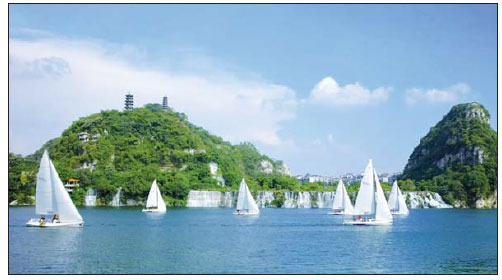New project tackles industrial pollution
Environmental experts from China and the United Kingdom are working to help China build an effective treatment system for soil and groundwater pollution at a project in Liuzhou, the Guangxi Zhuang autonomous region.
The project, organized by the Chinese Ministry of Science and Technology and the general consulate in Guangzhou, seeks to transfer environmental restoration and protection models from the city of Manchester in England, to promote sustainable development of Chinese cities and create a soil and groundwater bioremediation industry.
Bioremediation is the use of microorganisms such as fungi or bacteria to remove or neutralize pollution at contaminated sites.
A group of experts on soil bioremediation from both countries visited the industrial city of Liuzhou in late August. The experts conducted field research on land in the northern part of the city occupied by the Liuzhou Chemical Group and the Liuzhou Power Plant.
After the field research, visiting expert Kevin Jones, director of the environmental center at the UK's University of Lancaster, assured local officials that the plants' polluted soil could be reversed by biological means once the two enterprises are moved, and the land can be reused for the other purposes.
Liu Chuanlin, vice-mayor of the Liuzhou city government, briefed the visitors on the city's history, and environmental protection and economic transformation.
"Liuzhou and Manchester share many similarities in the need to transform the growth model and upgrade the industry," Liu said.
The remediation project was approved by the British Foreign and Commonwealth Office in May and funded by the China Prosperity Strategic Program Fund offered by the British government.
Like Manchester, Liuzhou became a regional industrial center in the 1930s, and a national manufacturing site in the 1980s, producing items as diverse as toothpaste and satellite parts.
Manufacturing contributes about 60 percent to the city's economic growth. Liuzhou's annual industrial production value is more than 400 billion yuan ($62.9 billion). An automobile manufacturing center, it produces about 2 million cars a year, about 9 percent of the national total.
Since the late 1990s, the city government has closed hundreds of small polluting factories and workshops, and paid special attention to treating water pollution. The government invested nearly 5 billion yuan in construction of 10 sewage treatment plants.
"Every penny spent on the environmental protection projects is worth it," said Zheng Jun-kang, Party chief of Liuzhou. "Although it does not boost economic growth directly, its social and ecological importance cannot be ignored."
By the early 21st century, the city had bid farewell to acid rain and the Liujiang River, a main river flowing through the city, had been restored. The city now hosts various water sports, including the F1 motorboat world championship.
Soil and groundwater pollution, however, remain a problem.
The power plant and chemical factory targeted in the remediation project, founded almost half a century ago, discharge airborne pollutants that the winter winds carry to urban areas.
The Liuzhou city government and local environmental experts will coordinate with the project's British experts on implementation of a bioremediation plan in the near future.
"In the future interactions, we need to learn not only the project's pollution management model, but also the Manchester city's experience in seeking a balance between industrial development and a good environment," said the vice-mayor.
Zhang Li contributed to this story.
Contact the writers through liyang@chinadaily.com.cn.
|
Restoration of the natural environment has made Liuzhou a popular destination for water sports. Yan Haoning / For China Daily |
(China Daily 10/20/2015 page18)









